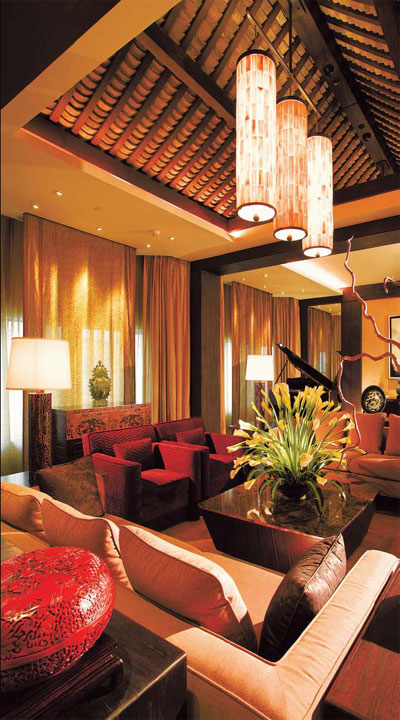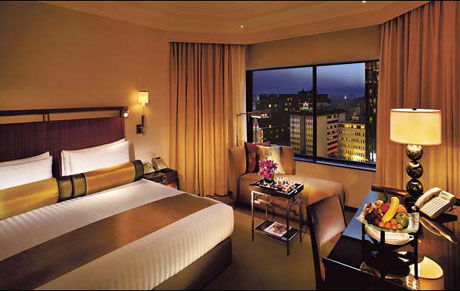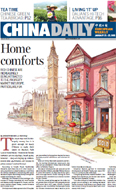Traditions of hospitality
Updated: 2010-10-11 09:25
By Raymond Zhou (China Daily)


The Peninsula Beijing is polished by age and grace and Raymond Zhou experiences this Beijing classic.
You have to understand the dual heritages of the Peninsula Beijing to fully appreciate its beauty and charm. First known as the Palace Hotel, it was an instant landmark when it opened in 1989. Situated in the Wangfujing shopping district, it is also within walking distance of the Forbidden City.
Take a left turn from the main entrance of the hotel, and 15 minutes later you'll be entering the eastern gate of the old palace - a somewhat secret entrance away from the throngs at Tian'anmen - that will immediately send you back in time into another era.
If you want a deeper dip into Chinese culture by learning more about making Chinese dumplings or intricate brush calligraphy, the Peninsula Beijing also offers what it calls "The Peninsula Academy". Excursions even include treks out into the "wild Wall", the less trodden but very downtrodden sections of the Great Wall, or a quick lesson in singing an aria of Peking Opera from an English-speaking master.
Shortly after the opening in the early 1990s, the hotel began to be managed by the Hong Kong-headquartered Peninsula Group, adding a touch of modernity to the hotel's ancient aura of imperial majesty.
The faade of the building reflects this unique mixture of old and new.
The archway bearing the hotel's name is traditionally Chinese, the tower has a quaint Chinese pavilion-type roof, but once inside the lobby, guests are welcomed with a display by the world's 50 top-brand luxury shops. Some, like Louis Vuitton and Tiffany & Co, opened their first Beijing stores here. This has made the hotel a must-visit for out-of-towners who want some of the high glamor associated with these brands to rub off.
Guests also get to enjoy the hotel's designer fleet of cars - especially a head-turning and very regal Rolls-Royce.
The 14-car fleet also includes BMW and Mercedes-Benz limousines, all in the hotel's signature green livery, and adorned with license plates that boast plenty of eights and nines - lucky numbers in Chinese culture.
The royal treatment starts from the door, where courteous doormen and bellboys usher in visitors like aristocrats. Many guests visit the lounge bar for afternoon tea, an English tradition and an established Peninsula heritage.
The Peninsula Beijing personifies top class hospitality that is never flashy. Its muted tones can best be described as imperial elegance, reflected both in its service and the physical dcor.
Huang Ting, the hotel's signature Chinese restaurant, brings you back to a time when Beijing's fast disappearing traditional dwellings were icons of the city. The restaurant's gray bricks were painstakingly collected from hutong courtyards that were being demolished and the pine flooring and beams were brought over from a garden mansion in Suzhou.
While the wooden chairs and tables are Ming reproductions, all other wooden fittings such as the ornate windows and panels are originals. If this is not royalty, it is at least nobility epitomized, possibly restored with more loving care than a real mansion.
The accolades do not stop here. The Peninsula's other restaurant, the "modern meets Asian" Jing, was chosen by Conde Nast Traveler in 2003 as one of "the top 75 hottest tables in the world".
For total relaxation, the 1,370-square-meter spa on the third floor provides an elegantly restrained and subtly Chinese environment, with top-of-the-line service thanks to training by spa authority Susan Harmsworth.
The Peninsula Beijing has 525 rooms and 57 suites for both business and pleasure. There are in-room facilities for the business traveler, including fax machines with individual dial-in numbers, free Internet access and plug-and-play for MP3 and MP4.
The view from the rooms says it all. While the decor inside is the perfect fusion of traditional and modern, the vista outside the window is of contrast and harmony. Sandwiched between gleaming towers of commerce are traditional Chinese courtyards with black-tiled roofs. In the heart of Beijing, you can stroll down the corridors of history with just one look.
Paper's Digest

Shaolin Kungfu
Shaolin Temple charts aggressive expansion plan to cash in on demand for kungfu.
Living 'IT' up
Father of pinyin
Touch and go
Specials

China Daily in Europe
China Daily launched its European weekly on December 3, 2010.

Hu visits the US
President Hu Jintao is on a state visit to the US from Jan 18 to 21.

Private Detective
Firms chart new strategies as tighter rules make information gathering tougher.
